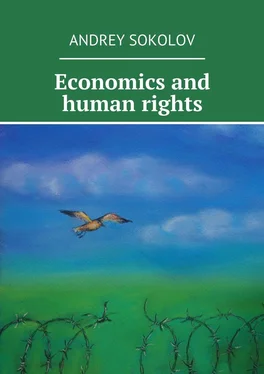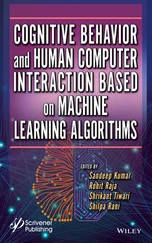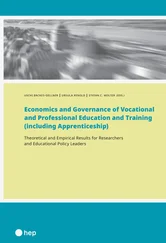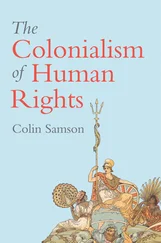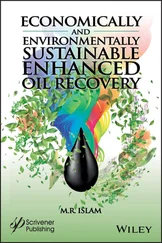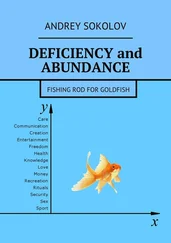Andrey Sokolov - Economics and human rights
Здесь есть возможность читать онлайн «Andrey Sokolov - Economics and human rights» — ознакомительный отрывок электронной книги совершенно бесплатно, а после прочтения отрывка купить полную версию. В некоторых случаях можно слушать аудио, скачать через торрент в формате fb2 и присутствует краткое содержание. ISBN: , Жанр: Юриспруденция, Публицистика, popular_business, Философия, на английском языке. Описание произведения, (предисловие) а так же отзывы посетителей доступны на портале библиотеки ЛибКат.
- Название:Economics and human rights
- Автор:
- Жанр:
- Год:неизвестен
- ISBN:9785449090874
- Рейтинг книги:5 / 5. Голосов: 1
-
Избранное:Добавить в избранное
- Отзывы:
-
Ваша оценка:
- 100
- 1
- 2
- 3
- 4
- 5
Economics and human rights: краткое содержание, описание и аннотация
Предлагаем к чтению аннотацию, описание, краткое содержание или предисловие (зависит от того, что написал сам автор книги «Economics and human rights»). Если вы не нашли необходимую информацию о книге — напишите в комментариях, мы постараемся отыскать её.
Economics and human rights — читать онлайн ознакомительный отрывок
Ниже представлен текст книги, разбитый по страницам. Система сохранения места последней прочитанной страницы, позволяет с удобством читать онлайн бесплатно книгу «Economics and human rights», без необходимости каждый раз заново искать на чём Вы остановились. Поставьте закладку, и сможете в любой момент перейти на страницу, на которой закончили чтение.
Интервал:
Закладка:
The point is not whether the legalization of prostitution or anything else is good or bad, but whether the right to engage in prostitution, the right to use this service to the right of a person to work and rest. Does the prohibition on prostitution limit the right to life and health for a prostitute and her client. And if the answer is positive, then prostitution should be legalized.
Drugs. The right to life also means the right to die. Or “The state! Be honest!”
Another nutrient environment for crime, another hole in the budget, another waste, instead of income, another failure to respect the human rights to life and health – drugs.
In this chapter we will look at some methods of combating drugs and criminal drug trafficking. These measures, on the one hand, make it possible to fully observe human rights, and on the other hand, reduce the number of drug addicts and illegal drug trafficking, prevent the emergence of new heavy drugs, and deprive drug revenue banks of the income and market.
These measures, despite the softness and unconventionality, have made it possible to achieve what could not be achieved with harsh police methods for many years. Namely: reduce the number of drug addicts, increase the number of requests for medical help to narcologists, increase the number of refusals from drugs, reduce the number of “first-time users”, reduce deaths from overdose, reduce the incidence of AIDS, hepatitis, tuberculosis.
We will analyze this by examples of countries that have partially or fully legalized drugs or have used such a method of struggle as decriminalization of drug use.
It is important to understand that drugs are not just heroin or marijuana, but also tobacco and alcohol freely sold in every supermarket. These drugs are legalized almost everywhere. The rest – almost everywhere outside the law for many years. And for many years the ban does not bring any economic benefit to countries and does not reduce the number of drug addicts or drug trafficking. This is called Sisyphean labor.
And this despite the fact that illegal marijuana or LSD have less public harm than alcohol. Addiction, addiction, to ecstasy, hallucinogens or marijuana, develops to a much lesser degree than to tobacco or alcohol.
The turnover of drugs is, on the one hand, a huge expenditure of the budget for catching drug addicts and dealers, and on the other hand – an excellent ground for criminals. The consequences of the ban are well known and have long been tested. The ban is income for crime and corruption.
The Global Commission on Narcotic Policy in June 2011 recommended that countries “experiment with the legal regulation of certain types of drugs that are permissible for possible legalization, in order to combat drug trafficking.”
What will happen if drugs are legalized?
Then they just like cigarettes or alcohol will start to bring income to the country’s budget, and not into the pocket of the mafia. The police will not deal with catching drug addicts with taxpayer money, but with protecting life and property of taxpayers.
Is it possible to legalize, for example, heroin?
Heroin is, in principle, a pretty quick death. If a person has the right to life, then he has the right to interrupt her at will. Otherwise, all hunting rifles should be banned – they can be shot, all high-rise buildings – they can jump off and commit suicide, all trains can be thrown under them. And, of course, you need to prohibit gas stoves and the sale of ropes in stores.
Will everyone rush to buy heroin if it can be sold legally? Of course not. Especially if lighter forms of drugs are available. Will everyone rush to sell heroin? Also no. Because they sell only what they buy. On what there is a demand.
Not so many people buy the permitted drugs – alcohol and tobacco. And strong alcohol buys even fewer people. So why should people rush to buy or sell a legalized heroin?
But to advertise drugs, including alcohol and tobacco, of course not worth it. Here the ban is completely justified.
As for soft drugs, drugs such as alcohol and nicotine have been legalized, then the ban on the legalization of marijuana, LSD or ecstasy looks rather strange and false.
We will analyze the statistics of prohibitions and permits for drugs in different countries, because, as in the case of prostitution, there are already examples of legalization or decriminalization of drugs.
From the Universal Declaration of Human Rights
Article 3.
Everyone has the right to life, liberty and security of person.
Article 5.
No one shall be subjected to torture or to cruel, inhuman or degrading treatment or punishment.
Article 7.
All are equal before the law and are entitled without any discrimination to equal protection of the law. All are entitled to equal protection against any discrimination in violation of this Declaration and against any incitement to such discrimination.
Article 12.
No one shall be subjected to arbitrary interference with his privacy, family, home or correspondence, nor to attacks upon his honour and reputation. Everyone has the right to the protection of the law against such interference or attacks.
Article 17.
(1) Everyone has the right to own property alone as well as in association with others.
(2) No one shall be arbitrarily deprived of his property.
Article 18.
Everyone has the right to freedom of thought, conscience and religion; this right includes freedom to change his religion or belief, and freedom, either alone or in community with others and in public or private, to manifest his religion or belief in teaching, practice, worship and observance.
Article 19.
Everyone has the right to freedom of opinion and expression; this right includes freedom to hold opinions without interference and to seek, receive and impart information and ideas through any media and regardless of frontiers.
Australia
In Australia, as in the United States, there is a difference in legislation for different territories. In the capital, you can freely store 25 g of marijuana (excess is punishable by a fine of $ 100), and in Queensland for a couple of cigarettes you can get 15 years in prison. (49) In Western Australia, storage and private use of marijuana are allowed (up to 2 plants, for excess – fine). In South Australia, New South Wales and Tasmania, the storage of hash is not considered a major offense.
Different and punishments. In Western Australia, people are sent for counseling to psychologists. In New South Wales, Queensland, Victoria and Tasmania, the storage and use of cannabis is considered a criminal offense, but more often the perpetrators are sent not to prison but to study or treatment. (51)
Since 2016, medical use of marijuana is allowed in Australia everywhere. (50)
Austria
The Austrian Law on Narcotic Substances of 1998 distinguishes drug producers and those who use them. The punishment depends on which group the violator belongs to. Drug use is decriminalized, that is not a criminal offense. However, possession for personal purposes is punishable by a fine or arrest for six months. It is permitted to use marijuana for medical or scientific purposes. (52, 53)
Argentina
In 2009, marijuana was decriminalized in minimal doses. (54)
Belgium
In 2003, the Belgian Parliament passed a law on the legalization of weak drugs. (55) Smoking marijuana, as well as drinking alcohol – you can. However, if as a result a person breaks the public order, breaking the law in the altered state of consciousness will automatically add to the hooliganism a more serious narcotic article.
Читать дальшеИнтервал:
Закладка:
Похожие книги на «Economics and human rights»
Представляем Вашему вниманию похожие книги на «Economics and human rights» списком для выбора. Мы отобрали схожую по названию и смыслу литературу в надежде предоставить читателям больше вариантов отыскать новые, интересные, ещё непрочитанные произведения.
Обсуждение, отзывы о книге «Economics and human rights» и просто собственные мнения читателей. Оставьте ваши комментарии, напишите, что Вы думаете о произведении, его смысле или главных героях. Укажите что конкретно понравилось, а что нет, и почему Вы так считаете.
